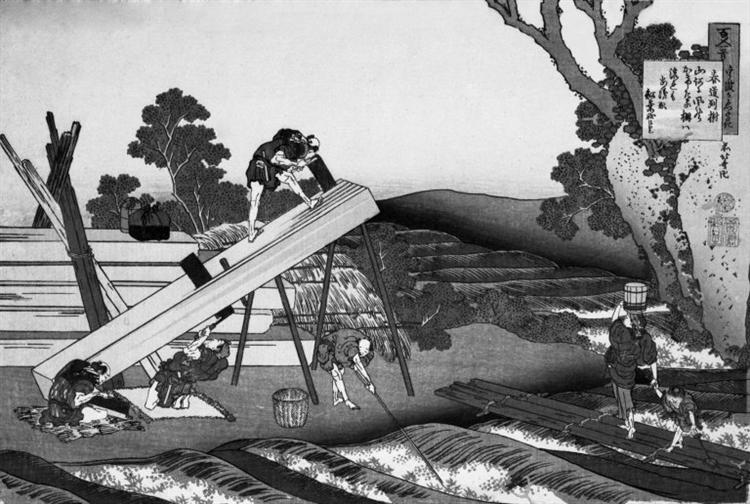Beskrivelse
The work “Sawyers Cutting a Log” (1839) by Katsushika Hokusai, a leading master of ukiyo-e, offers a fascinating look at the interaction between humans and the natural environment. This painting presents a remarkably dynamic scene, where action becomes the focal point, capturing the essence of the sawyers’ daily work, who are immersed in a laborious process that is at the same time essential to the life of the community.
The composition of the work is intentionally asymmetrical, which adds a sense of movement and energy. In the foreground, two sawyers are seen performing their task with evident concentration. The posture of each character, with their bodies extended and tools in hand, conveys the strength and skill required to cut the log. The depiction of these men is not just a study of human figures, but a tribute to the art of work. Hokusai breaks away from the traditional approach and, instead of idealizing his characters, gives them almost heroic qualities, showing their intrinsic connection with nature and their ability to modify it.
The trunk in question occupies the central space of the print, being a palpable symbol of nature itself. Hokusai, known for his meticulous study of landscapes and natural elements, has used the trunk as a narrative device. The detailed surface of the trunk, with its visible grain and texture, contrasts with the softer environment surrounding it, possibly depicting a rich, dense forest, common in Japanese iconography of the period. This suggests a deep appreciation for natural resources, as well as a respect for craftsmanship.
In terms of color palette, Hokusai plays with soft, earthy hues, evoking a sense of harmony and tranquility in the scene. The subtle blues and greens of the background suggest a serene landscape, while the robust brown of the tree trunk and the sawyers' clothing emphasize their primary role in the painting. Known for his innovation in color manipulation, Hokusai achieves a balance that invites the viewer to immerse themselves in the atmosphere of the work.
The context in which it was created deserves special mention. At this time, Japan was going through a period of transition, and Hokusai, through his work, helped to popularize ukiyo-e beyond the borders of his country, influencing Western artists as well. Although Sawyers Cutting a Log is less known compared to other iconic works by Hokusai, such as The Great Wave off Kanagawa, it represents a facet of his work in which he celebrates everyday life and human labor.
Hokusai's realistic and observational expression often challenges the conventions of his time, by showing people in scenes of toil. This work stands out for its focus on manual labor as a manifestation of Japanese culture, reflecting a sense of satisfaction and belonging. Through "Sawyers Cutting a Log," Hokusai not only captures a moment in time, but invites us to contemplate the relationship between humans and the world around them, interpreting rural life with respect and admiration. Thus, the painting becomes a testament not only to the talent of its creator, but also to a way of life that we miss in our modern age.
KUADROS ©, a famous painting on your wall.
Hand-made oil painting reproductions, with the quality of professional artists and the distinctive seal of KUADROS ©.
Painting reproduction service with satisfaction guarantee. If you are not completely satisfied with the replica of your painting, we will refund 100% of your money.

